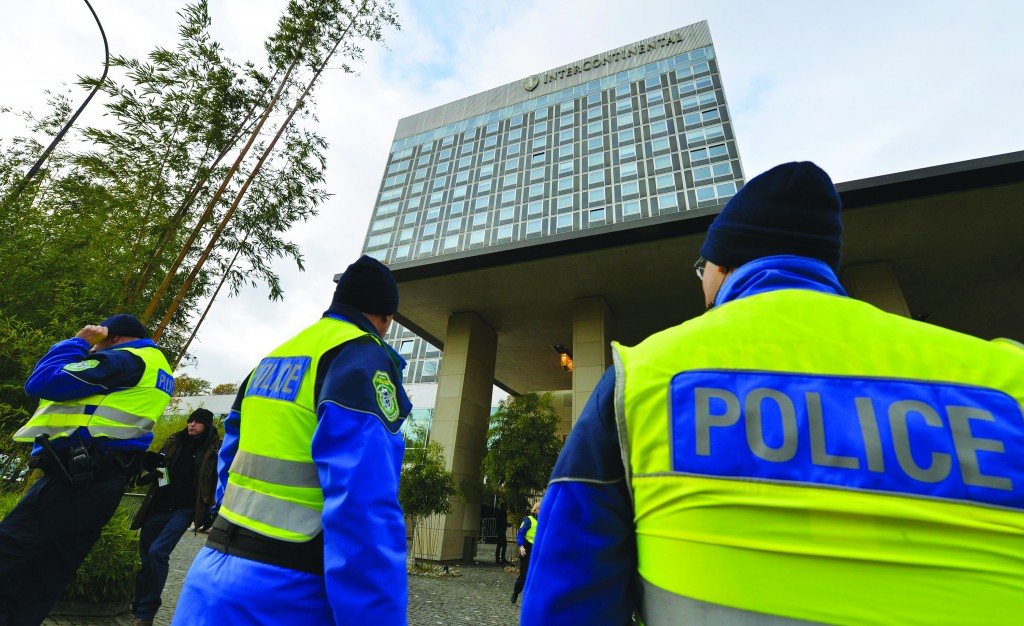Iran: Difficult Differences at Nuke Talks

Iran nuclear talks entered a delicate phase Thursday as negotiators tried to fine-tune a draft agreement that would limit Tehran’s atomic program in return for easing some sanctions. Iran’s ability to produce nuclear fuel and relief for Iran’s oil and banking sectors appeared to be among the sticking points.
Renewed opposition from influential members of the U.S. Congress to any deal they feel gives the Iranians too much for too little complicated the diplomatic maneuvering.
The Democratic-led Senate signaled Thursday it would only give President Barack Obama until next month before pressing ahead with new Iran sanctions, and a key Republican introduced legislation to limit the president’s future negotiating ability with Tehran.
Participants at the talks refused to spell out what was standing in the way of a deal. But Iranian statements and remarks from Western officials suggested they included finding mutually acceptable language on whether Iran has a right to enrich uranium, a technology that can produce both reactor fuel and nuclear warhead material.
Sanctions relief was also an issue.
The United States and its allies have signaled they are ready to ease some sanctions in return for a first-step deal that contains Iran’s nuclear program. But they insist that the most severe penalties — on Tehran’s oil exports and banking sector — will remain until the two sides reach a comprehensive agreement to minimize Iran’s nuclear arms-making capacity.
Iran says it does not want such weapons and has indicated it’s ready to start rolling back its program but wants greater and faster sanctions relief than that being offered.
A senior U.S. official told reporters last week that Iran is losing $5 billion a month in lost oil sales alone and $120 billion in total from all sanctions since their imposition, although he did not give a time frame. The official demanded anonymity in keeping with rules established by the U.S. administration.
The White House has not publicly provided a figure, but congressional officials said Wednesday the administration estimates Iran could get $6 billion to $10 billion in sanctions relief over six months as a first step, with additional relief depending on progress made toward a final deal. The officials on condition of anonymity because they weren’t authorized to divulge the estimate publicly.
Several Democrat and Republican senators have voiced displeasure with the parameters of the potential agreement, arguing that the U.S. and its partners are offering too much for Iranian action that stops short of a full freeze on uranium enrichment.
Senate Majority Leader Harry Reid warned Thursday that the Iranians could prevent any successful deal from emerging without the threat of new oil and financial penalties. He said the Senate must move forward with new sanctions after returning from a two-week recess next month.
Sen. Bob Corker, the Republicans’ top member on the Senate Foreign Relations Committee, proposed a bill mapping out what a final agreement should look like and seeking to restrict Obama’s capacity to offer sanctions relief.
The legislation gives Obama 240 days to conclude the deal and states he can only suspend restrictions on Iran if he certifies that such action advances U.S. national security interests and that Iran is fully complying with existing agreements. It says any final agreement must compel Iran to end all uranium enrichment activity, a condition the Islamic republic has steadfastly rejected.
Such moves added pressure on negotiators in Geneva who need to strike an initial deal that satisfies Congress while also meeting Iranian demands of maximum sanctions relief.
Even if an interim agreement is reached, prospects for a final-stage deal appear uncertain given the wide gulf between the two sides.
“The real problem is defining the broad contours of the end game. [The Iranians] need to know what will happen in the end,” said Ali Vaez, a senior analyst with the International Crisis Group. “I’m optimistic for the short term, pessimistic for the long term.”
The talks group six world powers and Iran. But negotiators for the six — the United States, Russia, China, Britain, France and Germany — were reduced to a side role Thursday, with top European Union diplomat Catherine Ashton shuttling between them and Iranian Foreign Minister Mohammad Javad Zarif as the two tried to chip away at differences.
As the talks moved into evening, Deputy Foreign Minister Abbas Araghchi told Iranian state media that the two sides had “common viewpoints in many cases, while there are serious differences in some cases.”
He said talks included possible ways to reduce sanctions on Iranian oil sales and banking.
A member of the Iranian delegation said his country recognizes that core oil and banking sanctions could not be lifted immediately but suggested Iran was looking for some relief over six months of the first-step agreement.
He also indicated that Iran was ready to discuss a limit on its uranium enrichment but said Iran wants some mention of its right to uranium enrichment —something the United States and its allies have long resisted. The delegation member demanded anonymity because he was not authorized to comment on the closed negotiations.
This article appeared in print on page 1 of edition of Hamodia.
To Read The Full Story
Are you already a subscriber?
Click "Sign In" to log in!

Become a Web Subscriber
Click “Subscribe” below to begin the process of becoming a new subscriber.

Become a Print + Web Subscriber
Click “Subscribe” below to begin the process of becoming a new subscriber.

Renew Print + Web Subscription
Click “Renew Subscription” below to begin the process of renewing your subscription.








